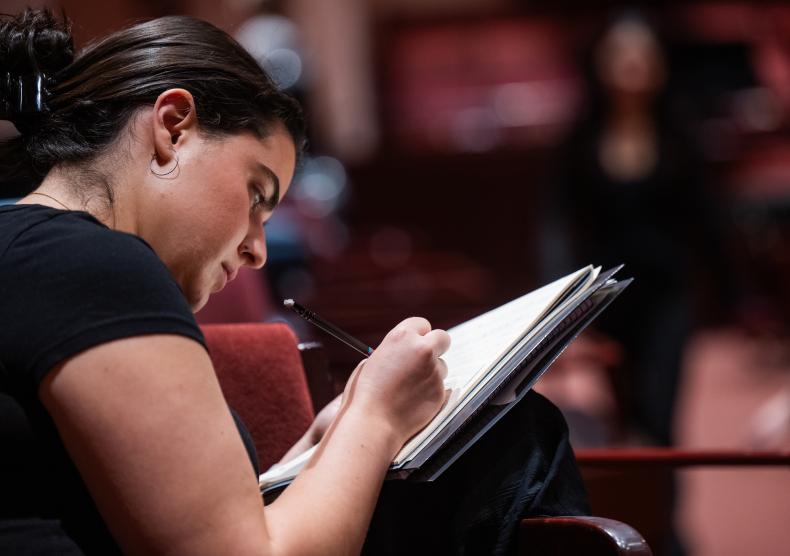
Rice University’s Shepherd School of Music offers undergraduate and graduate degree programs in music history and musicology, respectively. By design, both programs are small, with no more than five students enrolled in the combined programs during any given year. A one-to-one teacher/student ratio makes individual attention a key component of our degrees. The musicology faculty, all of whom are active scholars internationally known for their research and publications, are also dedicated teachers. Upper division and graduate musicology seminars feature limited enrollments, usually 5-10 students, which further foster student-teacher interactions. Also, music history and musicology students traditionally provide program notes for Shepherd School orchestral events under the guidance of the musicology faculty, who edit these notes and coach their writers. Our alumni have found considerable success in the most prestigious musicology doctoral programs in the country and in the profession itself.
The music history and musicology programs focus on the study of European and American art musics, the social contexts in which they were created and performed, and the performance practices relevant to them. Most of the nearly 300 students enrolled in the Shepherd School are performance majors, and their music making provides a stimulating laboratory for the study of the music and its cultural origins.
Rice University, the Shepherd School, and the city of Houston provide an ideal setting for the study of music. As a major research university, Rice offers a compelling intellectual climate to its students. Rice’s Fondren Library and Brown Fine Arts Library house significant general and music collections, and students are able to access remote materials with the assistance of the music librarian and the interlibrary loan department. An informal relationship between Rice and the University of Leipzig provides music history and musicology students holding the appropriate language skills with an opportunity to study for a semester at one of Germany’s oldest universities. The Shepherd School presents numerous concerts featuring faculty, students, student ensembles, musicians from the Houston area, and the finest touring ensembles. The city of Houston hosts concerts and other artistic events of the highest level through the Houston Symphony, Houston Grand Opera, the Performing Arts Houston, the Houston Ballet, chamber music entities, theater groups, and museums.
Faculty
Area of focus: History of theory; 17th- and early 18th-century Italian instrumental music; historical performance practice
Gregory Barnett , Professor of Musicology
Area of focus: Musical culture in France in the 19th and early 20th centuries; music of Claude Debussy and Maurice Ravel
Alexandra Kieffer , Associate Professor of Musicology
Area of focus: Late 18th- and early 19th-century music; romanticism; biography
David Ferris , Associate Professor of Musicology, Chair of Musicology
Area of focus: Medieval Latin and vernacular song; religious drama; music in preaching and intellectual history
Peter Loewen , Professor of Musicology
Area of focus: Twentieth-century opera; music of Benjamin Britten; opera and technology
Danielle Ward-Griffin , Assistant Professor of Musicology
Erik Broess , Assistant Professor of Musicology
Bachelor of Music in Music History
The Bachelor of Music degree program in Music History is a select program designed for students with a well-developed interest in the history of European and American art music. It provides a solid foundation in music history and theory, and fluency in performance.
The criteria for acceptance into the music history degree program include the following:
- Academic preparation equivalent to that of other applicants in the Humanities at Rice University (as demonstrated by courses taken, grades received, and scores earned on standardized exams);
- Advanced skill in writing;
- Special knowledge of music history and the field of musicology;
- Evidence of musical ability.
Master of Music in Musicology
The Master of Music degree program in Musicology is designed to provide students with a solid foundation in research methodology and prepare them for pursuing a doctorate in the field. The program includes classes and seminars in music history and bibliography, leading to a thesis based on original research. The range of courses is broad and encourages critical thinking as well as knowledge of history and current practices. Musicology students are joined in their classes by MM and DMA students majoring in performance or composition.
Teaching and research assistantships for musicology majors, covering partial tuition, full tuition, or full tuition and a small stipend, are often available.
In assessing applications, the musicology faculty will take into account the applicant’s academic and musical preparation; knowledge of music history, music theory, and the field of musicology; and skill in writing.
